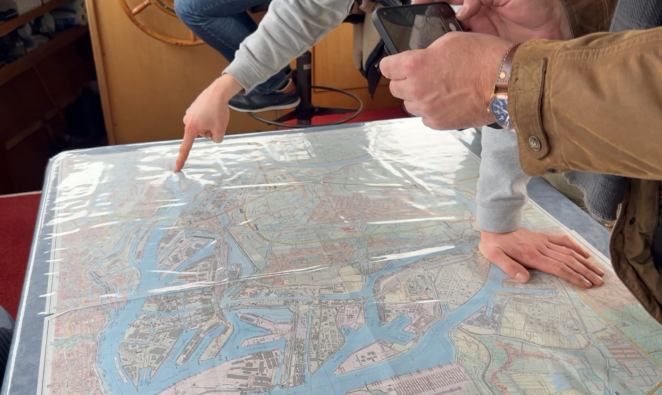Key Challange
Like many cities in the North Sea region, the Free and Hanseatic City of Hamburg has ambitious climate targets. These must also be accompanied by a fundamental change in motorised transport and a structural change in mobility (mobility transition). A major challenge here is to also consider commercial transport and develop solutions that reduce road traffic congestion and emissions, while at the same time ensuring reliable and efficient commercial transport.
Therefore, the primary challenge this pilot addresses is creating and showcasing solutions to establish an efficient and sustainable system for urban retail distribution by utilizing the underuntilised but exisiting network of waterways and canals in Hamburg, while reducing dependency on road-based freight transport.

Objectives
- Why?
The purpose of the FFC 3 pilot is to explore the potential of inland waterway transport (IWT) as a feasible and at the same time sustainable alternative to road-based freight in urban environments. Like many cities, Hamburg relies heavily on trucks for logistics, resulting in congestion, emissions, and inefficiencies in last-mile delivery. - How?
By testing IWT in the cities central HafenCity district, FFC 3 aims to assess its feasibility and demonstrate its scalability for sustainable city logistics while addressing operational and economic challenges. By testing a freight flow of retail goods under real operational conditions and by quantifying and comparing costs and emissions to illustrate the benefits of waterborne transport, FFC 3 want to show the feasibility and advantages of urban IWT as an innovative and sustainable solution for urban logistics. - Where?
The pilot will take place in Hamburg, with a focus on the HafenCity district.The methodology involves testing an inland waterway vessel. The vessel will operate along a 6 km long route, starting from the TOP Mehrwert-Logistik warehouse in Hammerbrook, east of the city center. The journey will follow the Mittelkanal, pass through a lock, and continue via the Norderelbe to reach HafenCity.
Project Partners
LIHH (Logistics Initiative Hamburg): coordinator of the freight flow coalition in Hamburg (FFC3 lead partner)
TOP Mehrwert-Logistik GmbH & Co. KG:Practical partner
Kühne Logistics University: Research partner
Bremenports GmbH & Co. KG (Bremen): Methodological support and dissemination of results, including through the InnoWaTr ‘Centre of Expertise’
Wirtschaftsverband Weser e.V. (Bremen): Knowledge transfer and active exchange of experience between FFC 2 & FFC3
Rhenus Partnership Hanse: Knowledge transfer and active exchange of experience between FFC 2 & FFC3
Source pictures: LIHH
Latest news
On 28th of November 2024, more than 40 stakeholders and researchers from Northern Germany and Europe met in Hamburg to discuss innovations and the path to autonomous inland shipping.
“What would happen if inland shipping disappears?” was one of the central questions posed to 14 students in the Department of Art and Design at the University of the Arts Bremen. Their current research and study project ‘Waterways’ is a part of bremenports' participation in the European-funded Interreg North Sea project InnoWaTr.
After a first successful meeting in Bremen, the northern German representatives of the InnoWaTr consortium were able to meet again in Hamburg on the 16th of May. Hosted at the offices of project partner TOP Mehrwert-Logistik GmbH & Co. KG, Regina Loitz and Maxim Heinrich gave a warm welcome and a tour of the warehouse, including the potential waterside loading and unloading point featured in the InnoWaTr video on YouTube
The InnoWaTr project is leading the charge towards sustainable urban logistics in HafenCity in Hamburg. Set to debut next year, the initiative will pilot an electric inland waterway shuttle for retail transportation.
From February 26th to 28th, Kühne Logistics University (KLU) in Hamburg was the kind host of 3rdpartner event of the Interreg North Sea InnoWaTr project. This gathering provided a valuable opportunity for project parters to share insights and work collaboratively, all geared towards advancing the project's mission of future-proofing inland waterway transport.
On 06.02.2025, the Northern German InnowaTr project partners bremenports, Rhenus Partnership Hanse (formerly NWL), TOP Mehrwert-Logistik & Wirtschaftsverband Weser followed the invitation of Logistics Initiative Hamburg and met for their 4th alignment meeting in Hamburg.